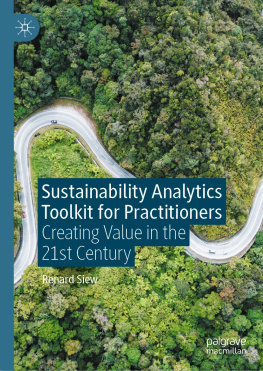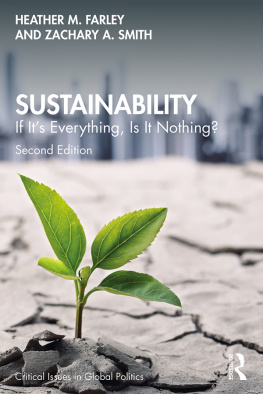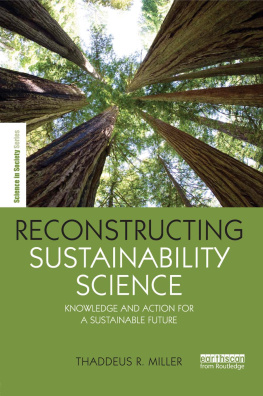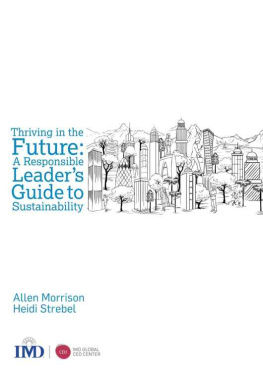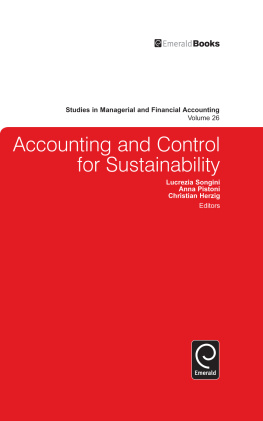SUSTAINABILITY AND DEGRADATION IN LESS
DEVELOPED COUNTRIES
For my daughters Serena and Clea,
and for all the children everywhere,
now and in the future.
Sustainability and Degradation in
Less Developed Countries
Immolating the future?
SARAH LUMLEY
The University of Western Australia
First published 2002 by Ashgate Publishing
Reissued 2018 by Routledge
2 Park Square, Milton Park, Abingdon, Oxon OXl4 4RN
711 Third Avenue, New York, NY 10017, USA
Routledge is an imprint of the Taylor & Francis Group, an informa business
Copyright Sarah Lumley 2002
The author has asserted her moral right under the Copyright, Designs and Patents Act, 1988. to be identified as the author of this work.
All rights reserved. No part of this book may be reprinted or reproduced or utilised in any form or by any electronic, mechanical, or other means, now known or hereafter invented, including photocopying and recording, or in any information storage or retrieval system, without permission in writing from the publishers.
Notice:
Product or corporate names may be trademarks or registered trademarks, and are used only for identification and explanation without intent to infringe.
Publishers Note
The publisher has gone to great lengths to ensure the quality of this reprint but points out that some imperfections in the original copies may be apparent.
Disclaimer
The publisher has made every effort to trace copyright holders and welcomes correspondence from those they have been unable to contact.
A Library of Congress record exists under LC control number: 2002018634
ISBN 13: 978-1-138-72845-5 (hbk)
ISBN 13: 978-1-315-18998-7 (ebk)
Contents
Hypothesis Tables
As the title suggests, this is a book about sustainability. While the main focus of the work is on less developed countries generally, and on the Philippines in particular, it has a strong global perspective. This perspective is in recognition of the fact that nothing on earth happens in isolation, and that the evolution of theories and concepts in sustainability, covered briefly in this book from their conception to the present, have relevance to all nations. It also acknowledges that understanding the experience of one nation has relevance to another.
The empirical work presented here relates to a case-study of farmers facing land degradation problems at four upland sites on the Philippines island of Leyte. In a broad sense the analysis examines the socio-economic factors that influence farmers decision-making about soil conservation adoption, with particular attention to farmers private time preference rates, discounting theory and the economic assumptions that underpin such theory.
Biogeophysical attributes and the history of the Philippines are also considered, in recognition of geographical, historical, cultural and political influences on decision-making, and on social and environmental sustainability. Perceived flaws in economic theory, and in its assumptions, interpretations and applications, are discussed in the context of promulgating socially and environmentally sustainable policies for the Philippines and beyond. Controversies embedded in global sustainability dialogues and debates are recognized and briefly discussed.
It is hoped that this book can make a small contribution to the development of theories and policies that can help to ensure, for the majority of the worlds people, a future that is better than the present.
Numerous people have made direct or indirect contributions to this book, including my teachers, my students, my colleagues, my friends and my family. They are too many to mention by name but I would like my thanks to go to them all. Particular acknowledgement is due to the following: Dr Bill Stent, Director of Economics in the former Victorian Department of Conservation and Environment; my friends and former colleagues there, Annette Bould and Athena Andriotis; Professor Greg OBrien, Dean of Law and Management at La Trobe University; Dr Rob Dumsday, La Trobe University; Ms Claire Thomas, Victorian Department of the Treasury; Mr Mike Smith, Former Director of Resources at the Department of the Premier and Cabinet; former colleagues at the EPA, Victoria; colleagues at ViSCA, Leyte; former colleagues in Geography at Deakin University; past and present colleagues in Geography at the University of Western Australia (UWA) including Associate Professor Dennis Rumley; Dr Brian Shaw; Dr Ian Alexander; Dr Marion Hercock; my colleagues in the School of Agricultural and Resource Economics at UWA; friends and colleagues in other UWA departments including Anthropology, English, Philosophy, Botany, Soil Science, and Asian Studies; research colleagues Associate Professor Pierre Horwitz and Dr Sue Nikoletti at Edith Cowan University, and Dr Matthew Tonts, UWA; Mr Jonathan Thomas, The Resource Economics Unit, Subiaco; Dr Jay Gomboso, WA Department of Conservation and Land Management; Professor Rob Fraser, London University; Dr Laura McCann, Columbia University, Missouri; my PhD students, Annette Baumann, Trudy Hoad, Fiona McKenzie, Ron Sheen and Nuri Dewi Yanti; Masters student Allan Dobra; Ian Baker; Lai and Cedric Baker; Neil and Molly Garland; Joan Phillips; Dr Charlotte Brack; Doris Tate and Graeme Henry; Bette Moore; Mark Ducksbury; Leni Brockmuller; Barbara Pedersen; Andrea Hinwood; Cathy and John Loughridge, and Dr Margaret Lumley. Special thanks are due to Andrew Kemp for rescuing my graphics. Lastly I must recognise the support of my sisters Philippa Thornton and Caroline Lumley; my parents Roma and Reg Lumley; my nieces Kate, Juliet, Emma and Georgina; my nephews James and Jonathan; and, of course, my delightful and long-suffering daughters Serena and Clea, who are always supportive of their mothers desire to write arcane texts.
| ACIAR | Australian Centre for International Agricultural Research |
| CBA | Cost-benefit analysis |
| CV | Compensating variation |
| EV | Equivalent variation |
| IRR | Internal rate of return |
| MOC | Marginal opportunity cost |
| NPA | New Peoples Army |
| NPV | Net present value |
| PTPR | Private time preference rate |
| STPR | Social time preference rate |
| TPR | Time preference rate |
| UNCED | United Nations Conference on Environment and Development |
| ViSCA | Visayas State College of Agriculture |
| WCED | World Commission on Environment and Development |
| WTA | Willingness to accept (compensation) |
| WTP | Willingness to pay |
where natural resources are concerned, we sacrifice a pretty accurately predictable future to present greed. We know, for example, that if we abuse the soil, it will lose its fertility, that if we massacre the forests, our children will lack timber and see their uplands eroded, their valleys swept by floods. Nevertheless, we continue to abuse the soil and massacre the forests. In a word, we immolate the present to the future in those complex human affairs, where foresight is impossible; but in the relatively simple affairs of nature, where we know quite well what is likely to happen, we immolate the future to the present.


